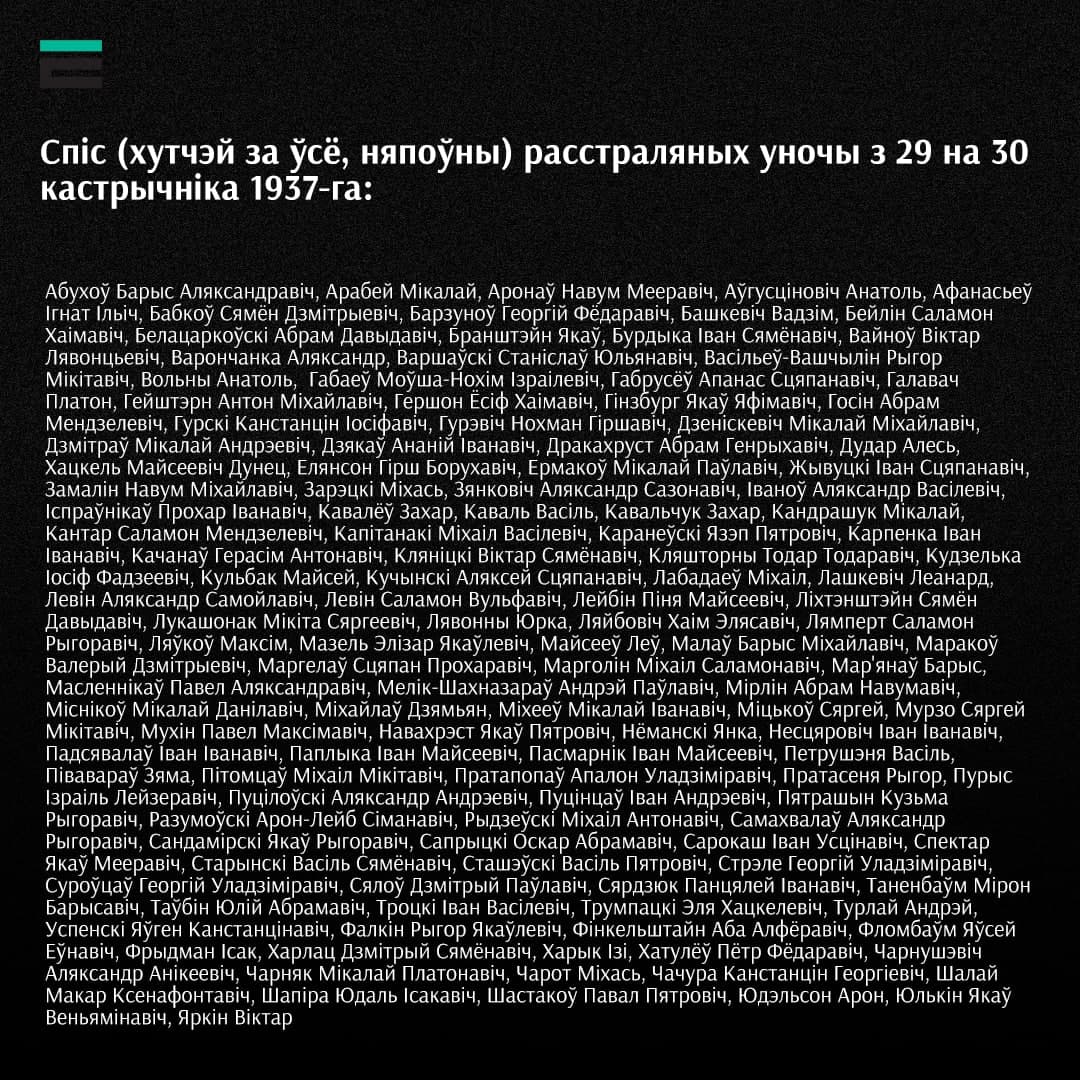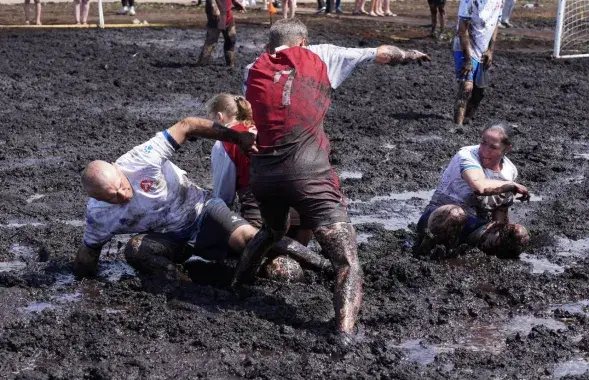Night of executed poets: Lessons of 1937 that Belarus has not learned
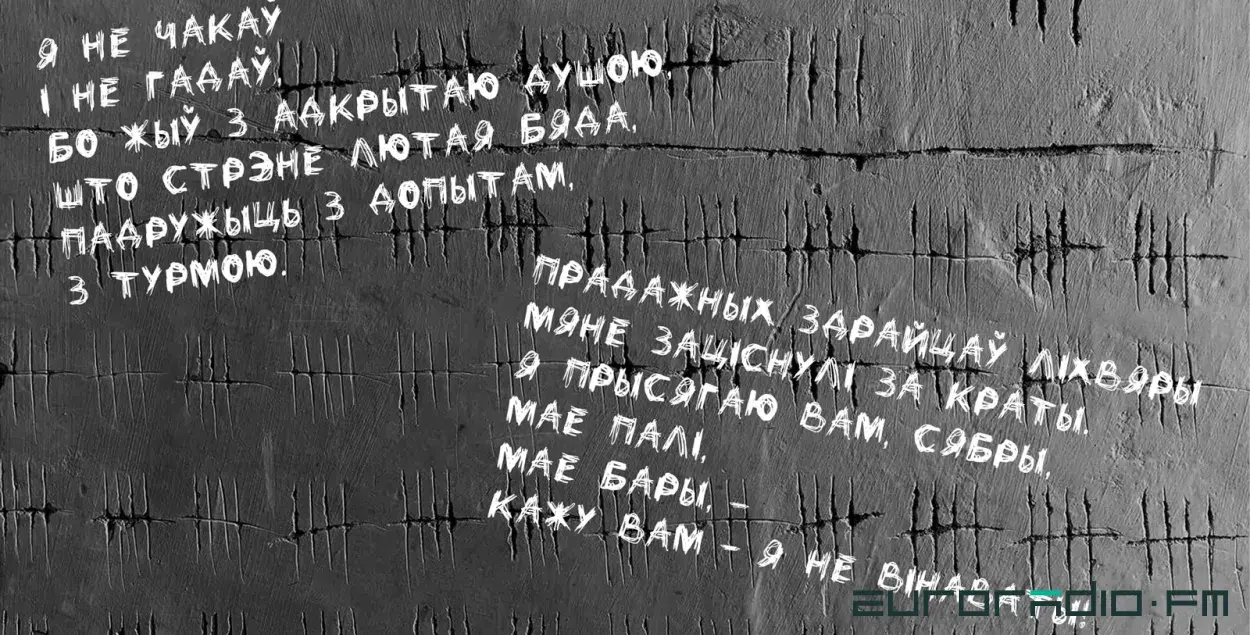
Poem by Mikhas Charot / collage by Ulad Rubanau, Euroradio
"More than 100 representatives of the Belarusian intelligentsia were executed on this night," that's how the articles in many publications began on that day.
But there were no such articles in October 1937. There were no obituaries, either. The Soviet press was preparing Soviet people for the celebration of the 20th anniversary of the USSR and for the elections to the Supreme Soviet.
Even on the day when 22 Belarusian writers were executed, the press did not change the agenda. "For the homeland to prosper peacefully and calmly, we are voting for Marshal Klim," read the festive pre-election poems printed "LiM".
Instead of obituaries, there was a list of slogans to glorify the Great October Revolution properly.
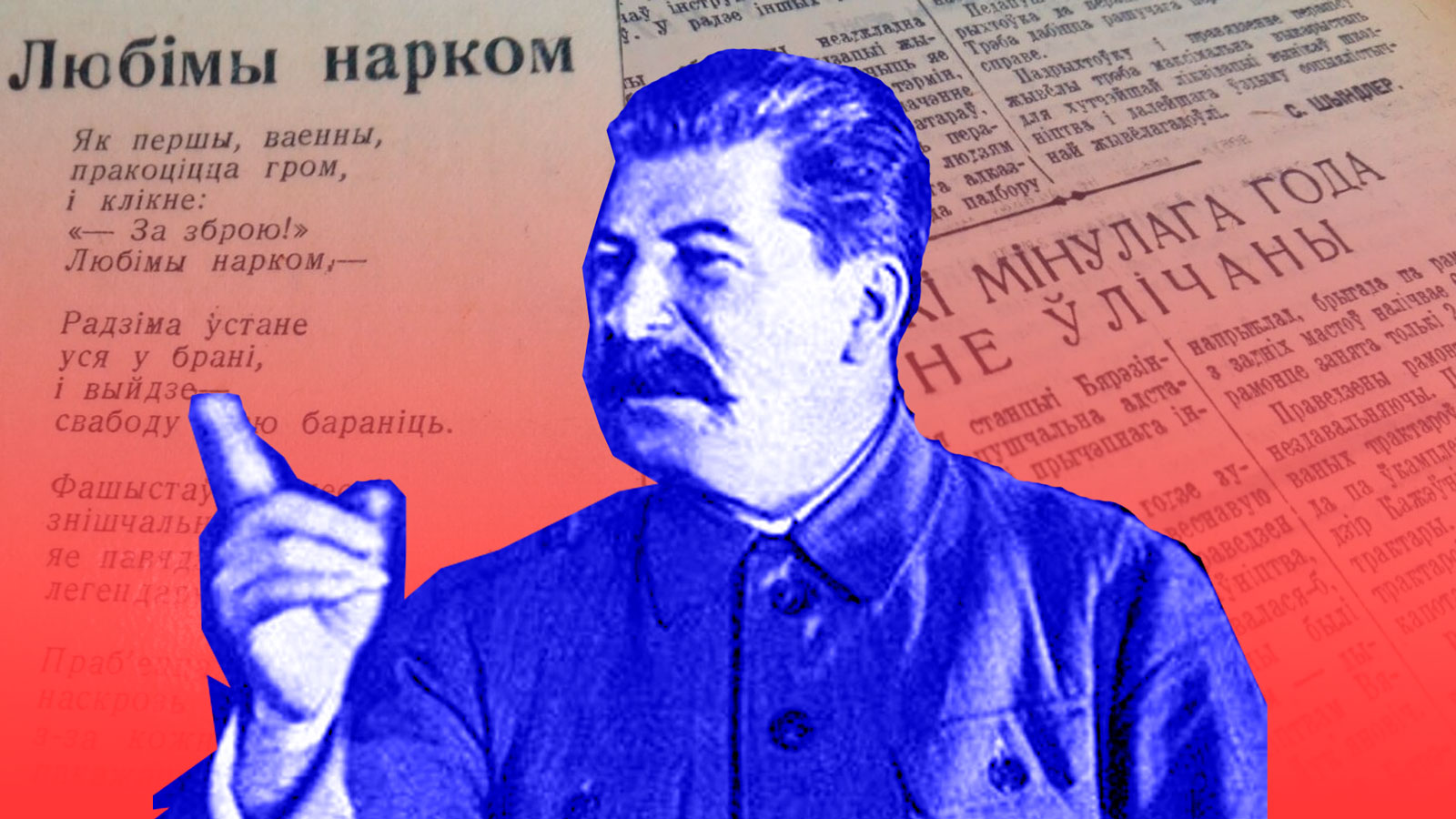
There is not a single word about the executed poets.
With no prisoner lists from "Akrestsin jail" or "Viasna," not only the public but even the families of those executed learned of the deaths years later. But even then, they were lied to: they were told that a prisoner had supposedly died in the camps in the 1940s from "heart failure."
It will take you about 20 minutes to read this text. It is just half a high school literature class. It was Hanna Seviarynets who helped us to understand the historical processes and compile a list of literature for extracurricular reading.
How the Intellectuals Became the Enemy
The first large-scale "cleansing" of the cultural field in Belarus began in 1930. It was the fabricated case of the "Union for the Liberation of Belarus". It was headed by Yanka Kupala. More than a hundred cultural figures were exiled outside the country at the time. "Outside" here means they started their journey through the gulags, says Hanna Seviarynets.

The activities aimed at destroying the national circles were going on all over the USSR. It was not just a Belarusian drama. It began in 1929, when Stalin finally got rid of Lenin's understanding of national republics and began to implement his course of unification, the merging of peoples into one "Soviet" nation based on Russian culture, the gradual but steadfast destruction of cultural differences.
In 1931, the newspapers were still cheerfully urging people "To consolidate the achievements of the Belarusianization month!" and were criticizing the teachers using Russian. But even in that year, so cheerful and "belarusified" at first sight, the life of Belarusian writers was no longer safe.
The same newspapers were full of accusations of natsdemovshchina or national democratic bias. At the same time, they praised the writers who were doing the "right" thing. But in 1937, among the executed poets were those who only a few years earlier had been praised by the Belarusian Association of Proletarian Writers (BAPW) in the state press.
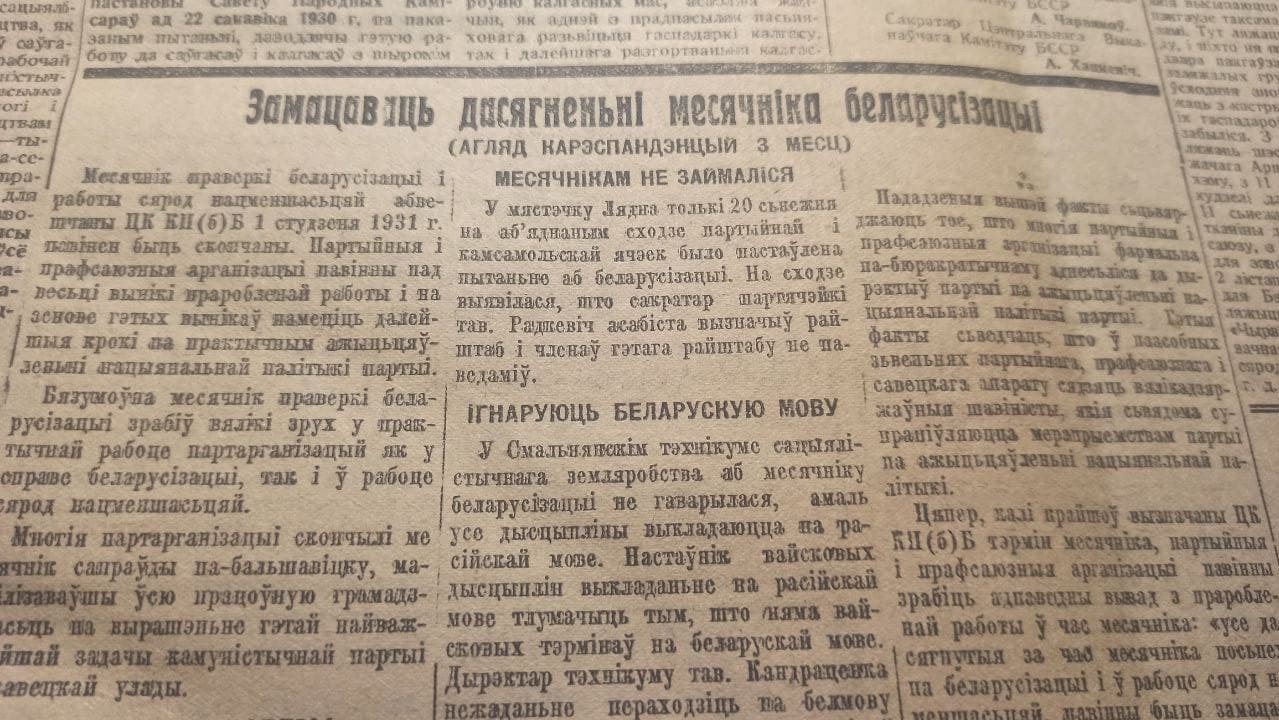
"The BAPW now has such representatives of proletarian literature as Lynkou, Halavach [executed by shooting on October 29, 1937], Murashka, Limanouski, Aleksandrovich, Charot [executed by shooting on October 29, 1937]," wrote Association member Kanakotsin.
How did Belarusization combine with accusations of natsdemovshchina? The answer is in the same article. Belarusian writers had to understand that it was "not from Skaryna, not from the feudalists Dunin-Martsinkevich, and not from Nasha Niva did the Belarusian proletarian literature grow, but only from the great October revolution."
While "Skaryna and Dunin-Martsinkevich" were enemies from the past, one should not have underestimated the enemies of modern times either. And these are the bohemia with "all its companions, drunkenness, revelry, detachment from the masses." Such behavior, "Savetskaya Belarussia" wrote, cannot be regarded other than as a manifestation of class hostility.
"A group of bohemian writers found a refuge in the Writer's House and felt "at home" there. Drunkenness, drunken quarrels, pornographic inscriptions on tables, books, calendars, correspondence were commonplace. All the adventures of this group became organized and grew into a group called TAVIZ - a society of lovers to drink and eat. The saddest thing is that such writers as A. Zvonak, V. Khadyka, Marakou [executed on October 29, 1937] and others are at the head of TAVIZ", the newspaper wrote in another article.
At this time, in the early 1930s, Marakou already had a premonition of what would happen to him in seven years:
"I'm happy to live here,
And for this land in the wondrous spring,
Maybe
They will take off my head,
They would pierce my body with a sharp spear."
Obviously, the proletarian writer could not afford not only "drunkenness and carousing," but also "poetry for the sake of poetry."
"We also have comrades who wander in the depths of decadent lyricism, who in no way can rise to the height of those tasks which confront proletarian literature, although they are stubbornly seeking it -- Marakou, Klyashtorny [executed on October 29, 1937]."
"Babareka [executed on October 29, 1937] supports the separation of poetry from social processes, for the 'Uzvyshen' definition of poetry," the Association of Proletarian Writers wrote in the pages of "Savetskaya Belarussiya." This "Uzvyshen poetry" was criticized for being "petty-bourgeois" and "aesthetic."
But it is not the criticism that kills.
"I am telling you -- I am innocent!"
And then came the year 1937.

And then those who allegedly compromised with the party line, but did it insincerely, were already affected.
Between 1931 and 1937 there were, of course, local sweeps, "intimidation" actions, pinpoint arrests, and even larger-scale actions like the trials of 1932 and 1935 in which cultural figures were again exiled to Siberia or even shot, but there had never been such a horrible execution of culture as on October 29, 1937 before, especially involing public figures. "Ordinary" people were executed by the hundreds before and after that.
There were no more "their own" "safe" for the system. Formerly loyal revolutionaries were declared spies and agents.
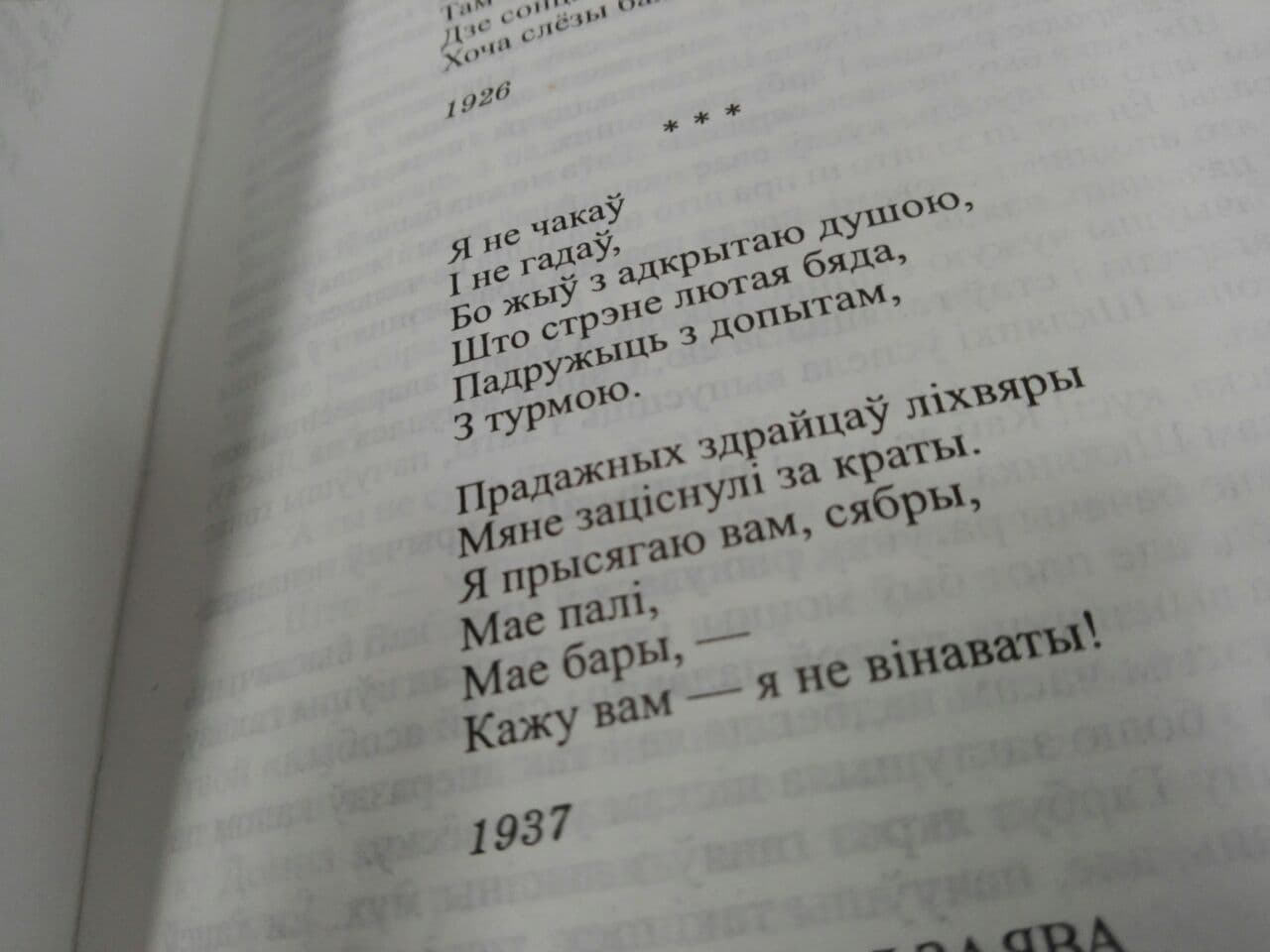
This poem is scratched on the wall of a cell in the Americana. Its author is Mikhas Charot. A poet, former editor of Savetskaya Belorusi, who all his conscious life cared about preserving the achievements of the revolution and opposed "natsdemovshchina".
But in 1937, the NKVD considered Charot as a Polish intelligence agent. He was detained in January. The evidence included documents, 210 journals, 85 books, 127 pages of correspondence, and a stack of manuscripts.
Nine months later, on October 28, an extrajudicial body of the NKVD sentenced Charot to capital punishment. A day later, he was shot.
The Soviet authorities did not care too much about the consistency of their actions. In 1935 Anatol Volny was awarded the title "Honoured Art Worker of Belarus". In the autumn of 1936, he was arrested. He was shot on October 29, 1937, by the verdict of the same extrajudicial body of NKVD.
The NKVD extrajudicial body was the "troika". They consisted of the person in charge, the secretary of the Regional Committee, and the public prosecutor. They could pronounce execution sentences, sending to a camp, or arrest them for 8-10 years. The absolute majority of the members of the "troikas" were also repressed.
A question for the instructor: why did the system have so many complaints against the intelligentsia?
"I cannot say for sure, but according to my observations, any mass repressions and the Stalin's repressions, in particular, had two trends, different in quality. One was about "ordinary people" - and there, the extermination was indiscriminate. According to plans, people were arrested en masse in wipeout mode.
And the second approach was about public people, primarily people of culture, journalists, writers, and artists. The people who were well-known to the public. In this case, they were targeted. People were especially "treated," "guided," provoked, monitored, and incriminating evidence was collected against them. They were not necessarily getting arrested, let alone executed. Suppose such a person agreed to a compromise and publicly renounced his principles or words, and began to follow all the requirements of the agencies. In that case, they could even be given an award, a position, and an apartment. But, surely, such people were held "by the scruff of the neck.”
They could also not receive an award, not get a job, not arrested either if the reputational risks of such an arrest for the authorities were higher than the supposed "damage" from the "enemy." That is why the Russian writer Boris Pasternak was not repressed and Mikhail Bulgakov was not arrested. Our Piotr Hlebka or Kandrat Krapiva, who had as many 'embarrassing' points in their biography as Kuzma Chorny or Adam Babareka, were never arrested and lived through this period out of prison and in good conditions. In short, among notable people, some were destroyed, some were bribed, some were blackmailed, some were really persuaded. There was more subtle work done by the agencies.
Undoubtedly, the intelligentsia is the most stubborn enemy of totalitarian regimes. Intellectuals, in essence, can only be opposed to the regime because they reflect, reason, and think critically. A rational person cannot help doing it. This is why, of course, it is perceived as an enemy under undemocratic conditions. But in fact, it is the first and most reliable assistant to an adequate government because it analyzes, comprehends, creates trends, and organizes discussion and debate.
Manuscripts burn if the NKVD orders it
In 1937, not only the poets but also their heritage were liquidated. Each of the executed writers' personal files had a certificate confirming that the material evidence of their guilt - letters, manuscripts, and photographs - was destroyed on August 1, 1937.

This certificate was made based on the destruction act signed by NKVD officers Abramchyk, Harbatsevich, and Sakalou, deputy chief of the internal NKVD prison.
We can understand what was destroyed there from the protocols of searches, which are also attached to the cases. According to some information, the historical drama "Rahneda" and the continuation of the novel "Kryvichy by Mikhas Zaretski, the works of Simon Baranovykh, Anatol Volny, Platon Halavach, Uladzislau Halubok, Tsishka Hartny, Syarhei Darozhny, Ales Dudar, Todor Kliashtorny, Valery Marakou, Mikhas Charot, hundreds of letters and diaries were destroyed by fire. I am afraid that the Belarusians lost more than they received from that generation.
But sometimes, we think that we'll find something when the KGB archives are unsealed. At least, in the 1980s, several manuscripts and photographs, as well as a few personal documents, were privately handed over by KGB agents to writers of that time. That is how, for example, according to a legend, the dramatic and very talented manuscript of Barys Mikulich's "Stories for oneself" got into the hands of Syarhei Hrakhouski.
Thus we are not losing hope and do not stop searching.
In the early 1990s, relatives of repressed poets got access to the files in the KGB archives of Belarus. Provided they could confirm that they were close relatives. This was very limited access, but selected pages of personal files could be read.
Among those who could see the archives was the nephew of the poet Valery Marakou - Leanid Marakou. He summarized the information of historians, archivists, relatives of other repressed poets and published a book called "Just one night".
This book shows the heritage investigators got their hands on during searches. Here are excerpts from the personal files of only a few writers.
From the personal file of Yanka Nyomanski, kept in the KGB archives:
"Seized: 4 notebooks, various correspondence, 11 notebooks, ten books edited by Pyatrovich, the book "War with the White Poles", the magazine "Polymya" - 25 pieces, "Red News" - 2 pieces, two books edited by Nekrashevich, one book edited by Dunts, one book edited by Hartny and various books - 7 pieces, all correspondence and documents".
From the protocol of the search conducted in the apartment of Mikhas Zaretski:
"Letters - 44 pieces, postcards - 13 pieces, telephone, and telegram addresses - 10 pieces, three telegrams, nine parcels with extracts from counter-revolutionary Trotskyist literature, 19 notebooks, 20 notebooks with different notes, 20 photos, 50 group photos, two notebooks. Manuscript on 3,129 sheets. Miscellaneous correspondence on 953 sheets. Books with autographs - 83 pieces, books of different authors and editions - 80 pieces, Zaretski's works - 36 pieces".
From the protocol of the search conducted in the apartment of Mikhas Charot:
"...documents, magazines - 210 pieces, books - 85 pieces, correspondence - 127 pages, manuscripts - one pack".
Question for the teacher: how to avoid getting caught in the wheel of repression? Did literary figures have that chance in 1937?

They did, and some consciously chose that model of behavior.
The first condition was to be in complete agreement with the Russification. It was possible not to be a communist, to have repressed relatives, to correspond with foreigners and not to suffer if you chose total loyalty to Russian culture without reservations.
Hence the dictionary by Kandrat Krapiva. It was heavily russified and thus detrimental for the Belarusian language. Hence the incomprehensible identity of our folklore in the studies led by Pyatro Hlebka; hence the apologetics of Moscow in the poems of Arkadz Kulyashou.
Hence also the execution of Dudar or the sentence of 28 years in GULAG for Dubouka. They simply could not physically or constructively accept this compromise. Although they tried, and pretended to.
But we didn't know!
"A cell for ten people with about a hundred of us there. Wet with sweat, in our underwear, lying right on top of each other. And the latrine of forty buckets starting to ferment from the heat. In the morning, the warden opens the door and steps aside from the smell wave...!"
Being a poor man, a Party member, a responsible worker, a tireless activist from his youth, a proletarian poet, he never imagined that he too would have to suffer such misery and be suspected of such incredible crimes. For the first time, after being pushed, after torture, into a crowded cell, he sat down at the threshold, listening to the snoring. And then there came a voice from the upper bunk:
"Young man, come here and lie down with me.”
The priest told him in a half-whisper about himself, comforting:
"You'll get used to it, young man. This is the fourth time I've been locked up. I come home and before my mother turns the first pancake on the frying pan, I look out the window and see the Antichrist in a blue and red hat again!"
Yanka Bryl wrote these memories of his character Mikola Khvedarovich were in the book "I write as I live.” Khvedarovich lived through the thirties. He was arrested in 1938, and in 1940 he was sentenced to 8 years in prison. In 1955 he was rehabilitated and was able to talk about the conditions of his imprisonment.
The following year saw many people being rehabilitated. In the run-up to the XXth Party Congress, when Stalin’s personality cult was being debunked, the state press published totally different, "constructive" literary critique. It was stated that literature had become disconnected from life.

Then, in the sixties, everyone said, "But we didn't know! Our eyes got opened!" Although, of course, they knew and understood a lot. But the level of repressions was such that it was absolutely impossible to raise a voice against it and give any "reaction of society".
Incidentally, Belarus resisted Sovietization for a long time. It was done step by step, in personal courageous and desperate actions, secret meetings, partisan initiatives, persistent resistance to the collective farms. The level of repression, among other things, indicates that the authorities were forced to go along with it and to keep the level of violence constant. It is not simply because there were sadistic and sick people in the law enforcement agencies (there were some, but they were in the minority). It was because there was always a blunt but relentless resistance from the inside.
But even when the cult of personality had been put to rest, the state continued to lie.
In 1956, Nika Vechar turned to the Ministry of Internal Affairs of the BSSR to request information about the fate of her husband Platon Halavach. As a wife of the shot counterrevolutionary activist, she was sent to Karaganda concentration camp of NKVD in 1938. After liberation, she returned home and, in the summer of 1956, asked for information about her husband. Her personal file contains the following certificate:
"1st special department of the Ministry of Internal Affairs of the BSSR has received an application from Vechar Nika Fedarauna about the search of Platon Ramanavich Halavach, who was sentenced to the execution by the Supreme Court of the USSR. I ask for your agreement to tell the petitioner Vechar N.F. that her husband, Halavach P.R., died of heart paralysis on December 25, 1944, while in a camp.
Resolution: "I agree. 19. VIII".
More than 60 years have yet to pass until we are able to leaf through the pages of the KGB and Interior Ministry archives from 1917-1953. The KGB archives will be transferred to the State Archive only in 2081, the MIA archives -- in 2084.
Question for the teacher: Is there any chance that life in Belarus will one day be defined by poets and not by those who execute them?

I would not like us to have a limited choice: either poets or executioners. Let the law written by honest lawyers and protected by non-corrupt services determine life in Belarus. And let the people of Belarus - farmers, workers, builders, railroad workers, doctors, teachers, journalists, business people, IT specialists, and, of course, poets as well - model, discuss, comprehend, and create life according to the law.
Extracurricular reading
We asked Hanna Sevyarynets to compile a must-read list of works by executed writers. Not "for the next class" -- but so that there would be no "next lesson".
"Of the prose, the collection "The Fewest of the Fools" by Mikhas Zaretski is worth reading. I will not spoil the book, but on the whole, in my opinion, this is a perfect reflection of the issues people faced at the time, which later was actively glossed over by both literature and, of course, the authorities.
It's more complicated with poetry, because poetry in general always depends strongly on the context, on the reader's awareness, on their ability to read poetic texts, especially poetry of the twenties is very complex, deeply metaphorical, contains encoded texts, so I do not know whether "everyone" can read it.
But for people interested in poetry in general and this period in particular, I would recommend a triad of outstanding poems, which contain, in the words of Ales Dudar, "the disappointments of the first sorrows and the sorrows of the first daydreams."
These are Uladzimir Dubouka's poem "Circles", Pyatro Hlebka's poem "Carmencita" and Todar Klyashtorny's poem "When the sludge settles.”
Some day, I want to publish them under one cover, with a good foreword and commentary, so that the reader gets the necessary context of the era and, accordingly, an opportunity to read these texts in depth. The poems have a glimpse of that difficult time.
